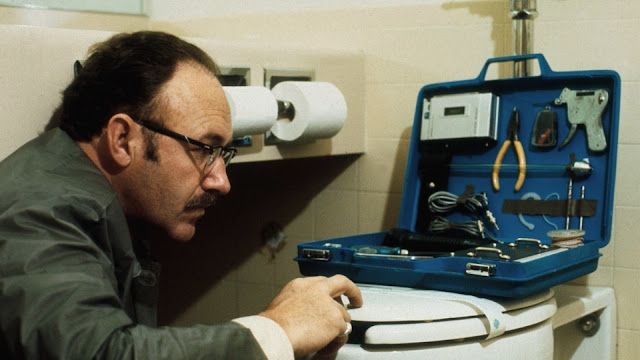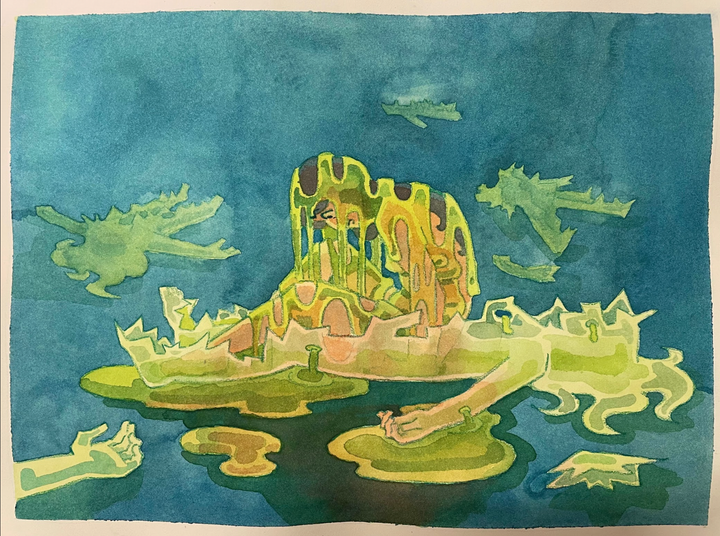Film Society x The Student: “The Conversation”
Max Feigelson ’27 reviews “The Conversation,” arguing the lesser-appreciated Francis Ford Coppola film is like the third epic Homer never wrote.

Nobody’s favorite Francis Ford Coppola movie is “The Conversation” (1974).
In our cultural imagination, Coppola is the Homer of twentieth-century film. His “Iliad” was “The Godfather” Parts I and II: A saga of a reluctant warrior (Michael Corleone) torn between glory and honor on the battlefield (in his father’s mob) and domestic tranquility back home (with his wife, Key). His “Odyssey” was “Apocalypse Now”: The story of a lost warrior (Captain Willard) and his motley crew journeying through mythical horrors (the Nùng River) on his way to reclaim his home from those who have taken it from himself (kill a traitorous colonel: A bit of a stretch, but just roll with it).
These are two epics, or perhaps more accurately, they’re epics lifted from their classical contexts and placed in a modern setting. “The Godfather” brings us from the sands of Troy to the streets of 1950s New York; “Apocalypse Now” takes us from the isle of Ithaca to the jungle of 1970s Vietnam. Each film bends literary classics to the screen with finesse. You must not watch these films alone on your laptop: They are meant to be experienced in the theater.
Western literature only has two works that we can confidently attribute to Homer, so we’ll never know what he might have accomplished if he were asked to compose a third tale. In Coppola’s case, however, the answer is quite clear. The director of the two monumental epics that are now considered some of the best films of all time birthed an awkward stepchild between “The Godfather” and “The Godfather Part II.”
“The Conversation” popped out of Coppola’s creative womb by Caesarian section a few pounds underweight compared with its siblings, and it’s worth seeing if only to understand what our cinematic Homer might have composed with a much lower budget and a yearning to be wholly original.
Amherst Cinema is showing “The Conversation” as part of a nationwide re-release for its fiftieth anniversary, so each screening begins with a couple comments from Coppola about his thoughts on the film. This event, hitting independent theaters nationwide, also takes place on the eve of Coppola’s first new film in thirteen years, “Megalopolis” (2024), which, judging from the trailers, looks to be a return to the grandiosity of “The Godfather” and “Apocalypse Now.” What uniquely ties “The Conversation” to “Megalopolis” however, is that both are original screenplays written by Coppola himself.
Originality is legacy in the eyes of this director. No matter the hype around his most famous films, Coppola has always been a bit bitter that they were built on the backs of previous written works (“The Godfather” was based on the novel of the same name by Mario Puzo, and “Apocalypse Now” was based on Joseph Conrad’s “Heart of Darkness”).
Indeed, he never wanted to be a “big Hollywood director.” Coppola says in interviews that he always wanted to be known for small, original, and interesting movies like “The Rain People” (1969) and “The Conversation.” It’s a bit tough to believe that Coppola wouldn’t want people to remember him by his epics, especially when he makes millions from them, but the sentiment we can carry into a discussion of the film is nearly universal among artists. The literary critic Harold Bloom might diagnose Coppola with a bad case of the “anxiety of influence.” “The Conversation” represents Coppola’s (largely successful) attempt to generate content ex nihilo so that he may properly call it his own.
The film concerns technology. That is, while “The Conversation” spends a lot of time establishing the premises of microphones, long-range lenses, and voice-recording hardware, it employs this technology as a means to a complex character study of its lead, Harry Caul (Gene Hackman). Our Netflix generation is familiar with this narrative approach through the show “Black Mirror,” which, as its name cleverly suggests, uses technology as a way of understanding people (by looking into the “black mirror” of our phone, we see ourselves in a new, techno-suffused light). Technology is interesting, but the people using — and being used by — technology are always more interesting. As philosopher Martin Heidegger might put it, the question concerning technology is, at the bottom, a question concerning our orientation (“Gestell,” in the German) towards technology. It is from this angle that we get a narrative and a broader perspective.
Harry Caul is a surveillance security expert hired to record a conversation between a young couple in a busy San Francisco park. The opening scene shows Harry and his team at work. Outfitted in long-range microphones and cameras, the team walks beside the couple, snipes them from rooftops and windows, and hides in a covert van. As we later find out, this is an ambitious operation for a surveillance job; it’s far beyond the capabilities of anyone less talented than Harry.
Perhaps the film’s greatest innovation is its sound design by Walter Murch, whose artistry goes unrecognized in the credits largely because “sound design” didn’t yet exist. (The first film to offer credit to a “sound designer” is “Apocalypse Now,” which credits the very same Walter Murch.) Murch produces half of the movie’s soundtrack, which, as “soundtrack” suggests, need not be music: The initial conversation is repeated incessantly as Harry’s obsession with decoding the couple’s intentions grows. The other half is provided by David Shire, whose haunting original album isolates Harry on an island of paranoia and obsession and leaves him there to desiccate.
The movie is largely about sound and its recordings, and it plays on this subject by involving the viewer in the game of audio analysis. The initial conversation is warbled and at points inaudible, but we can hear just enough to understand the affection the young man and woman feel for one another. Harry’s friendly, fun-loving employee (John Cazale), whose attitude is directly opposing that of his cold, lonely boss, remarks at the film’s opening that “sometimes it’s nice to know what they’re talking about.” Harry’s response firmly roots him at the beginning of a yet-to-begin development arc of paranoia: “I don’t care what they’re talking about. All I want is a nice, fat recording.”
He’s wrong, of course: Harry craves human connection about as much as anyone else. Unfortunately, he makes a business out of exploiting relationships, and has therefore learned that human connection is vulnerability, and vulnerability is death. His lifestyle is predictably depressing. He lives alone and abhors his neighbors, whom he considers invasive but are clearly just trying to get to know him. He maintains a secret affair with a bedridden woman (Teri Garr), but refuses to tell her anything more about himself than is strictly necessary. At one point, he’s seduced by a woman at a party (Elizabeth MacRae) because alcohol has lowered his guard, and his solipsism is validated when he wakes up the next morning he finds that she was hired to steal his recordings.
Harry’s obsession with decoding the message of the conversation ends up being the key to solving a murder, but his motivation is unlike that of any run-of-the-mill Sherlock. We feel that he’s not only looking for clues in his repeated listening but attempting to join a moment of tender connection by proxy. His only hobby is playing the saxophone alongside jazz recordings: A practice that is at once communal and hopelessly alone — a summative picture of Harry’s isolation.
Compared with its epic siblings, “The Conversation” is narratively tight. A planned murder drives the plot to its climax and keeps Harry and the audience intent on deciphering the conversation. But unlike a classic detective drama, Harry’s involvement with the murder is ancillary at best. He’s a security camera become sentient; a marginal player looking at a high-stakes operation from the outside in. He’s hired to get the “fat recording” and get paid: His obsession is not part of his job description. There could be another movie made from the perspective of the purposefully blank “executive” (Robert Duvall) and his lackey (Harrison Ford) about whom the murder-drama revolves, but “The Conversation” is more interesting than a classic revenge drama.
The murder drives the plot forward at an almost agonizing but still satisfyingly slow pace, and its resolution is terrifying. This reviewer, in an embarrassing moment he wishes he could take back, was the only one in the theater to scream aloud. The movie’s narrative engine is its murder mystery, yes, but the engine is hauling the character of Harry Caul, whose gross, voyeuristic psychology, portrayed with incredible precision and tact by Hackman, combines the genres of murder mystery and character study and elevates the film beyond both.
I’m generally uninterested in the fact that this movie was released at the height of the Watergate scandal and that the recording technology Harry employs is the same as that used by Nixon’s team. I’m also generally uninterested in the ways by which this movie may be interpreted in light of ever-more-invasive surveillance technology developments from the digital age. I am, however, interested in good movies and the criteria by which we decide which ones are worth writing about and watching. It’s for this reason that “The Conversation” should be seen and listened to, and seen and listened to again. It’s enough to watch as our cinematic Homer crafts something that may be watched alone on our laptops at home, but never alone enough.




Comments ()